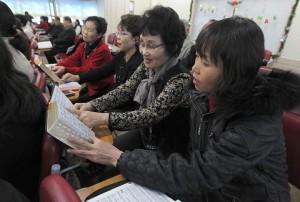The number of North Korean refugees reaching South Korea continues to rise. Most make it with the help of Christian missionaries who take North Koreans along what is called the underground railroad, which runs through China to Southeast Asia, where its easier to seek asylum. But resettled refugees themselves now play a bigger role in bringing their family and friends to the South.Ji Sang Hyun was not sure if he would ever see his mother again. It was 2006 and she had escaped North Korea two years earlier. Ji, now 28, and his younger brother and sister had also fled and were hiding in northeast China.
That is when he got a phone call.
He says that his mother called him from South Korea. She had decided that China was too dangerous for the family to stay there, so that is why she went to South Korea.
China repatriates North Koreans it finds who entered the country illegally. Human rights groups and refugees say those repatriated are sent to prison camps where they are tortured or even executed.
So Ji’s mother arranged for a smuggler to escort him and his brother to Laos and then onto South Korea. But Ji says they could not find their sister in time to take her with them.
It was only this September that Ji and his family finally located her.
He says his sister had no idea whether they were back in North Korea or in the South. She found out through a friend in China that they were in Seoul. They contacted her and paid a human rights organization to help bring her to Seoul.
Ji’s sister is now at a government facility where North Koreans stay for three months and learn to adjust to life in South Korea.
That facility, called Hanawon, is expanding to accommodate the growing number of refugees who make it here. More than 20,000 have arrived since fighting in the Korean War ended in 1953. More than half of them have arrived since 2007, driven by poverty and repression in their homeland.
And some refugees and their advocates say many more are soon to come.
“Gradually we are going to see a snowballing number of people and it’s not all to the credit of the underground railroad,” said Tim Peters, an American missionary whose Seoul organization assists defectors in reaching South Korea.
Peters says that resettled North Koreans in the South are playing a bigger role in helping relatives get out of China. Some have established their own network of brokers and work in parallel with missionaries.
“Virtually every refugee who makes it safely and resettles in South Korea has probably made a sworn oath to two to three to four other family members or very close associates in North Korea that the resettled one is going to do everything possible to get those other people out,” Peters said.
Peters says some defectors even go back to China themselves to bring loved ones to the South.
Kim Seok Hyang, a former official at Seoul’s Ministry of Unification, the agency that oversees North Korean resettlement, says refugees are doing whatever they can to raise funds to help their families escape.
Kim says many defectors, especially women who make of the majority of refugees here, use the few thousand dollars they receive as a government stipend to pay brokers to bring their loved ones to the South.
And if that money is not enough, some turn to the sex trade.
“They want to sacrifice themselves to get that amount of money. In their point of view, they need to save their family members and they have no other choice other than their body,” Kim said.
Defector Ji Sang Hyun says he does not know how much money his mother paid to have him, his brother and sister brought to South Korea.
He is just glad his sister finally made it so the family can live together once again. But it is not an entirely happy ending.
Ji says his father at first did not want to defect, but when he learned that they were all going to South Korea he tried to escape North Korea, too. But he was caught by border guards and tortured in a prison camp.
Ji says he later learned that his father died just days after being released from prison.

